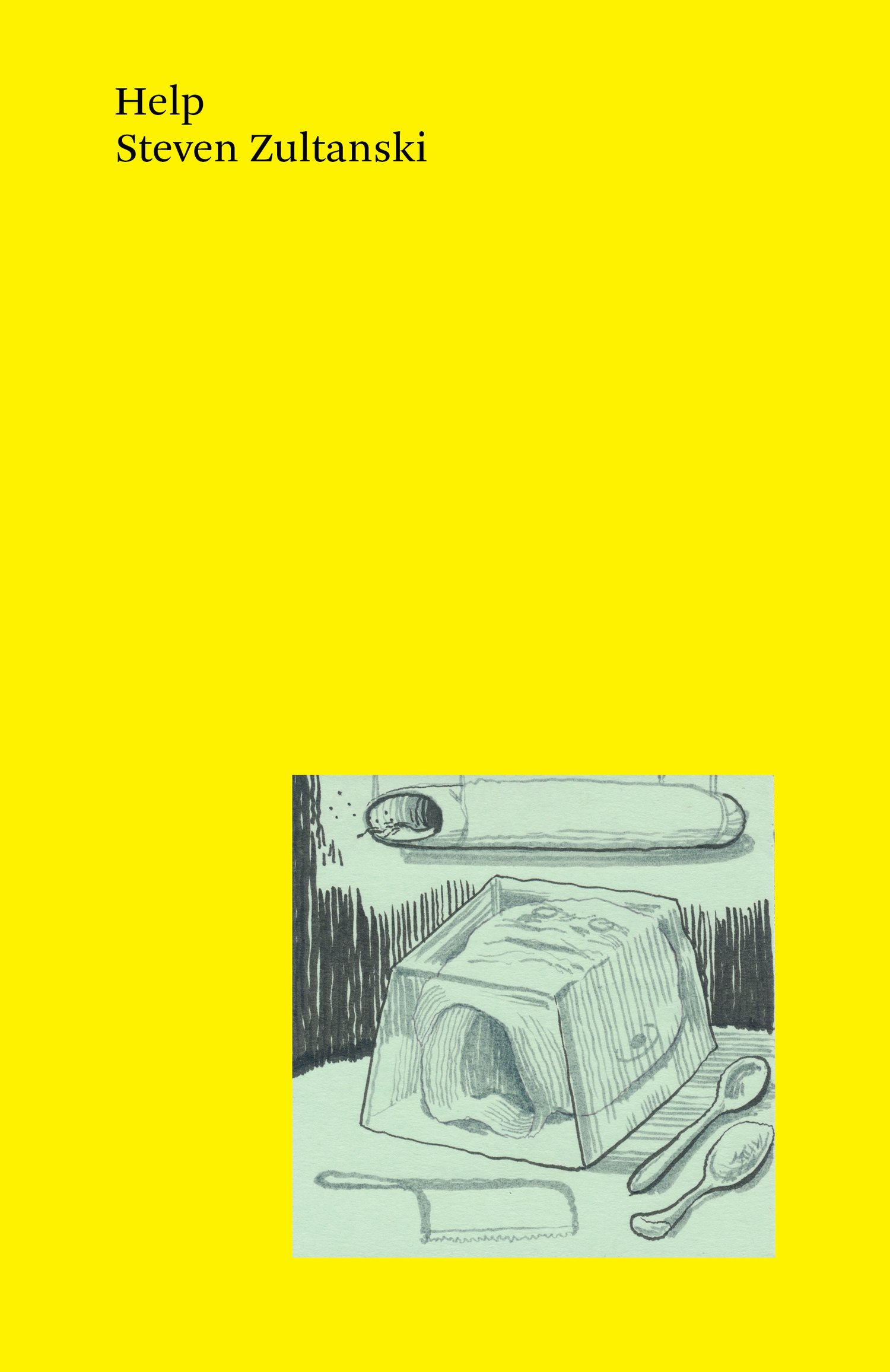
Steve Zultanski, Help
£18.50
Tenement #18 / ISBN: 978-1-917304-04-7
175pp [Approx.] / 140 x 216mm
Edited by Dominic Jaeckle
Designed and typeset by Traven T. Croves
04.04.25
Brilliant, willfully obtuse, indeterminate, and excruciatingly voyeuristic, Help re-orchestates and dissects the everydayness of our feelings, restaging them around spatulas, a glass of water, a group of friends eating breakfast and talking. Zultanski's proscriptive, quasi-improvised script deregulates our offhand affects and turns them into what they were all along: stage props in the mise en scenery of our lived lives.
Tan Lin
Help is a completely unique and compellingly brilliant work. I was riveted by the strange theatre of discussion, the sociality of speech and the hilarious, macabre themes it naturally leads to. I wish there were more writers like Zultanski, writers playful and secure enough to so simply nudge existence into new terrain. Alas there are very few, so we have to grab rare works like this when they come around.
Holly Pester
•
A quartet of ‘semi-detached’ conversations
from the poet.
•
It’s very early. Six friends are sitting around a table in a kitchen.
They are about to begin playing a game which involves
remembering the deaths of people they didn’t know very well:
acquaintances, neighbours, teachers, classmates, co-workers,
short-term friends with whom the friendship never really
stuck, etc. There’s a pile of spatulas on the table. Some are
wooden, some are plastic, and some are metal. These are props
for the game: before someone recounts a death, they throw a
spatula to the floor to signal the beginning of the story.
[…]
You want to start?
Steve Zultanski,
from a poem called 'Breakfast's Ready'
•
Death-obsessed, disengaged and over-invested—the four long poems assembled in Steven Zultanski’s Help theatricalise morbid fascinations, self-protective impulses, and unfocused desire. Help is, at its core, a set of conversations; the result of games played between friends that were then transcribed, edited, and embellished. Participants were asked to talk about loss, the death of acquaintances, secret hiding places, mislaid time, unmet demands, and the resulting poems read like meandering scripts for unrealised plays. Incidental excavations of persona and place.
In Help speech is pinned to the page and individual voices begin to appear as specimens. It is a catalogue of active disappointments, repeated anti-climaxes, and half-finished dissections. Someone demands endless love, but not from anyone in particular; someone squirms around in their chair, but for no communicable reason; someone hides in a shed, waiting to be found; someone sits in the ‘imagination room,’ and can think of nothing but biographical time. Help isolates these voices and dislocates them—flattens them—displaying them in a kind of vitrine. There’s no vitriol, no explication—but rather a thread of observations that veer toward fiction. These poems are a perpetuation of childish anxieties in the face of impossible need.
Somewhat reminiscent of Linda Rosenkrantz’s Talk (1968) or Alice Notley’s transcription poems of the 1970s, in Help the poet pretends to be a recording device, and the poem an act of remembering. Zultanski’s writing is at once skeletal and overstuffed, dryly unsentimental and yet dripping with melodrama. Help foregrounds its own contradictions in a collection that is at once both extremely personal and distinctly artificial.
•
Praise for Zultanksi
Steven Zultanski doesn’t so much risk the obvious as aspire to it, as the Latin poets did.
Robert Glück
Steven Zultanski is a great raconteur. In Honestly, he loquaciously monologues about everything from municipal corruption to asparagus horticulture with charm and authority. But this prose-like poem isn’t merely a filibuster. As it unfolds, Honestly spirals closer and closer to the silence behind speech.
Chris Kraus,
on Zultanski’s Honestly (Book*hug, 2018)
If King Lear’s fool wrote a book, it might be something like Bribery.
The Poetry Foundation,
on Zultanski’s Bribery (Ugly Duckling Presse, 2014)
Praise for Zultanski & Atkins’ Sorcerer
I once compared Sorcerer to a Harold Pinter play. But Pinter never instructed you on how to dismantle your face, amplify your house plumbing, levitate your computer, dance with your sofa, or place a penknife on a bed so that it appears as if no one put it there. Atkins and Zultanski’s play redesigns the contemporary home as a machine for comedy, sadness, and anxiety. Sorcerer is a unique work of theatre and literature, beautiful and unsettling. I can only relate it to the words of the late, great Angela Lansbury: “My family always said I’d travel anywhere to put on a false nose.”
Dan Fox
Vivid on the page, Sorcerer is a surprising and compelling hallucinatory theatre text for a cast of three. In it a set of hyper-naturalistic micro-conversations are laid out in an unblinking deadpan; crisp dialogues that focus in on the body, mapping the detail of daily actions and experiences from the removal of clothing, to the acquisition of new skills, and the precise interior feeling of headaches. Meanwhile, in a dynamic counterpoint to all the talk, a series of playful and increasingly strange physical transformations of the performers and the space they inhabit are proposed. Atkins and Zultanski have made the score for a complex, haunting event.
Tim Etchells
•
See here for a further word on this title.
•
Stickered editions will carry a cover adornment; a to-scale reproduction of a Post-It drawing by the artist, Ed Atkins (© 2024).
•
Steven Zultanski is the author of several books of poetry, including Relief (Make Now, 2021), On the Literary Means of Representing the Powerful as Powerless (Information as Material, 2018), Bribery (Ugly Duckling Presse, 2014), and Agony (Book*hug, 2012). With the artist Ed Atkins, he co-wrote and co-directed Sorcerer, a theatrical project which has been realised as a play, a film, and a book (published by Prototype, 2023). Zultanski’s Help was first published in the USA by Golias Books, 2024. He lives in Copenhagen.